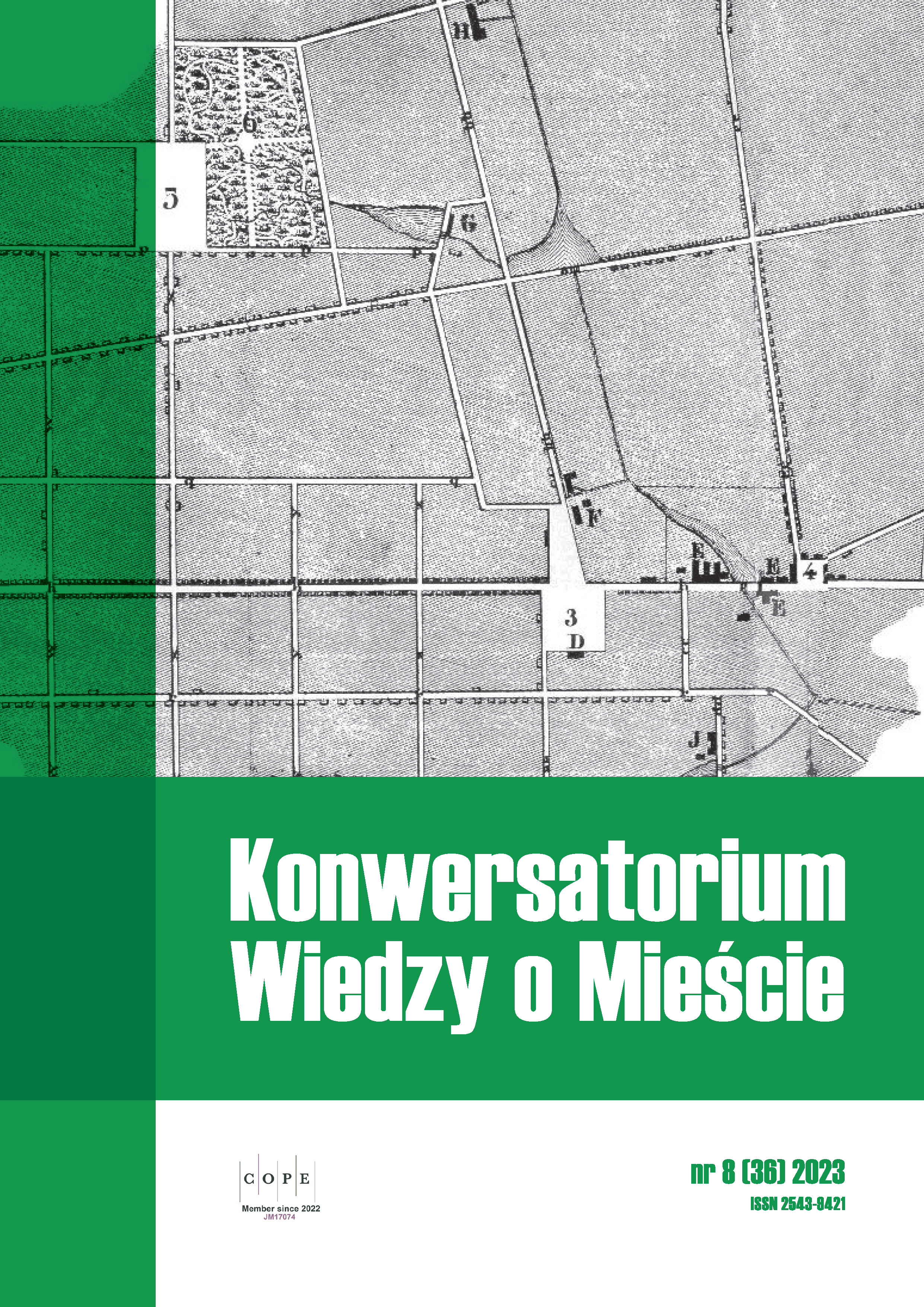Geographical patterns in explaining social problems: theoretical and methodological foundations
DOI:
https://doi.org/10.18778/2543-9421.08.08Keywords:
geographical patterns, social problem, theory, methodology, explainingAbstract
The aim of the research is to present and explain the definitional and thematic scope of social problems and geographical patterns and to indicate the adequacy of human concepts belonging to specific explanatory patterns. The thematic scope of issues considered by geographers and included in social problems is subject to modification, while research interest groups are subject to significant changes too. Human concepts, regardless of the time of formulation, are subject to academic analysis in particular geographical patterns. Over time, individual patterns are distinguished by their co-occurrence. The variety of explanatory patterns taken into account in the study of social problems poses many difficulties related to the multitude and variety of definitions used, as well as the attributes associated with them. Empirical work never has all the features of a given pattern. Theoretical foundations can be adapted to various specific cases carried out through empirical research, and can also serve social and economic policy, including resolving contemporary demographic challenges.
References
Best, J. (2006). Whatever happened to social pathology? Conceptual fashions and the sociology of deviance. Sociological Spectrum, 26(6), 533–546. https://doi.org/10.1080/02732170600948816
Google Scholar
DOI: https://doi.org/10.1080/02732170600948816
Cameron, A. (2006). Geographies of welfare and exclusion: Social inclusion and exception. Progress in Human Geography, 30(3), 396–404. https://doi.org/10.1191/0309132506ph614pr
Google Scholar
DOI: https://doi.org/10.1191/0309132506ph614pr
Case, C.M. (1924). What is a social problem? Journal of Applied Sociology, 8, 268–273.
Google Scholar
Chmielewski, P. (2011). Homo agens. Instytucjonalizm w naukach społecznych. Poltext.
Google Scholar
Cox, K.R., Golledge, R. (red.). (2015). Behavioral problems in geography revisited. Routledge.
Google Scholar
DOI: https://doi.org/10.4324/9781315668314
Dentler, R.A. (1967). Major American social problems. Rand McNally & Company.
Google Scholar
Domański, B., Libura, H. (1986). Geograficzne badania wyobrażeń, postaw i preferencji. Przegląd Geograficzny, 58(1–2), 143–164. http://rcin.org.pl/Content/13228/WA51_16244_r1986-t58-z1-2_Przeg-Geogr.pdf
Google Scholar
Domański, R. (1964). Procedura typologiczna w badaniach ekonomiczno-geograficznych. Przegląd Geograficzny, 36(4), 627–660. https://rcin.org.pl/Content/8663/PDF/WA51_16400_r1964-t36-z4_Przeg-Geogr.pdf
Google Scholar
Dopfer, K. (2004). The economic agent as rule maker and rule user: Homo sapiens oeconomicus. Journal of Evolutionary Economics, 14(2), 177–195. https://doi.org/10.1007/s00191-004-0189-9
Google Scholar
DOI: https://doi.org/10.1007/s00191-004-0189-9
Eyles, J. (red.). (1986). Social geography in international perspective. Croom Helm.
Google Scholar
Eyles, J., Woods, K.J. (2014). The social geography of medicine and health (RLE Social & Cultural Geography). Routledge.
Google Scholar
DOI: https://doi.org/10.4324/9781315848570
Frysztacki, K. (2009). Socjologia problemów społecznych. Wydawnictwo Naukowe Scholar.
Google Scholar
Gaberle, A. (1993). Patologia społeczna. Wydawnictwo Prawnicze.
Google Scholar
Gillin, J.L., Blackmar, F.W. (1915). Outlines of sociology. Macmillan.
Google Scholar
Goode, E. (2002). Does the death of the sociology of deviance claim make sense? The American Sociologist, 33(3), 107–118. https://www.jstor.org/stable/27700318
Google Scholar
DOI: https://doi.org/10.1007/s12108-002-1014-2
Goode, E. (2004). Is the sociology of deviance still relevant? The American Sociologist, 35, 46–57. https://doi.org/10.1007/s12108-004-1023-4
Google Scholar
DOI: https://doi.org/10.1007/s12108-004-1023-4
Gregory, D. (1978). Ideology, science and human geography. Hutchinson.
Google Scholar
Habermas, J. (1987). The theory of communicative action. Beacon.
Google Scholar
Harari, Y.N. (2014). Sapiens: A brief history of humankind. Harvill Secker.
Google Scholar
Jałowiecki, B. (1985). Old and new problems of urban pathology. W: K.E. Haynes, A.R. Kukliński, O. Kultalahti (red.), Pathologies of urban processes (s. 167–178). Finnpublishers Oy.
Google Scholar
Kiełczewska-Zaleska, M. (1958). O kierunkach rozwoju geografii człowieka w Polsce. Przegląd Geograficzny, 30(3), 403–419. https://rcin.org.pl/Content/16913/WA51_29494_r1958-t30-z3_Przeg-Geogr.pdf
Google Scholar
Kukliński, A.R. (1985). Pathologies of urbanization processes – conference reassessment: Tampere vision. W: K.E. Haynes, A.R. Kukliński, O. Kultalahti (red.), Pathologies of urban processes (s. 439–444). Finnpublishers Oy.
Google Scholar
Kuzyshyn, A., Kuczabski, A., Poplavska, I., Zadvornyi, S. (2022). Risk assessment of the social sphere development on the example of areas of the Carpathian-Podillia region (Ukraine). Czasopismo Geograficzne, 93(3), 473–493. https://doi.org/10.12657/czageo-93-19
Google Scholar
DOI: https://doi.org/10.12657/czageo-93-19
Kwaśniewski, J. (1991). Zakres pojęcia i problematyki patologii społecznej. W: T. Szymanowski (red.), Patologia społeczna. Wybrane problemy (s. 18–28). Wydawnictwo Wyższej Szkoły Pedagogiki Specjalnej.
Google Scholar
Leszczycki, S. (1956). Kilka uwag o geografii ekonomicznej (na marginesie konferencji w Osiecznej). Przegląd Geograficzny, 28(3), 463–486. https://rcin.org.pl/igipz/dlibra/publication/29509/edition/16934/content
Google Scholar
Leszczycki, S. (1973). Perspektywa rozwoju nauk geograficznych. Przegląd Geograficzny, 45(2), 247–256. http://rcin.org.pl/Content/14222/PDF/WA51_16344_r1973-t45-z2_Przeg-Geogr.pdf
Google Scholar
Ley, D. (1977). Social geography and the taken-for-granted world. Transactions of Institute of British Geographers, 2(4), 498–512. https://doi.org/10.2307/622303
Google Scholar
DOI: https://doi.org/10.2307/622303
Lisowski, A. (2003). Koncepcje przestrzeni w geografii człowieka. Uniwersytet Warszawski. Wydział Geografii i Studiów Regionalnych.
Google Scholar
Maris, R.W. (1988). Social problems. The Dorsey Press.
Google Scholar
Markiewicz, A. (2013). Koncepcje człowieka w przestrzeni życia społeczno-gospodarczego. Górnośląskie Studia Socjologiczne. Seria Nowa, 4, 117–132. https://journals.us.edu.pl/index.php/GSS_SN/issue/view/1002/750
Google Scholar
Mills, C.W. (1943). The professional ideology of social pathologists. American Journal of Sociology, 49(2), 165–180. https://www.jstor.org/stable/pdf/2770362.pdf
Google Scholar
DOI: https://doi.org/10.1086/219350
Panelli, R. (2004). Social geographies: From difference to action. SAGE Publications. https://doi.org/10.4135/9781446220351
Google Scholar
DOI: https://doi.org/10.4135/9781446220351
Panelli, R. (2009). Social geography. W: R. Kitchin, N.J. Thrift (red.), International encyclopedia of human geography (s. 185–194). Elsevier.
Google Scholar
DOI: https://doi.org/10.1016/B978-008044910-4.01002-6
Pattison, W.D. (1964). The four traditions of geography. Journal of Geography, 63(5), 211–216. https://doi.org/10.1080/
Google Scholar
DOI: https://doi.org/10.1080/00221346408985265
Peterson, E.T. (red.). (1946). Cities are abnormal. University of Oklahoma Press.
Google Scholar
Pióro, Z. (1962). Ekologia społeczna w urbanistyce na przykładzie badań lubelskich i toruńskich. Arkady.
Google Scholar
Rubington, E., Weinberg, M.S. (red.). (2011). The study of social problems: Seven perspectives. Oxford University Press.
Google Scholar
Rykiel, Z. (1984). Transformations of the paradigm of Polish socio-economic geography. Concepts and Methods in Geography, 1, 33–43.
Google Scholar
Rykiel, Z. (1991). Koncepcje geografii społecznej. Dokumentacja Geograficzna, 3–4, 9–17. https://rcin.org.pl/igipz/dlibra/publication/35844/edition/21089/content
Google Scholar
Sack, R.D. (1997). Homo geographicus: A framework for action, awareness and moral concern. The Johns Hopkins University Press.
Google Scholar
Sack, R.D. (1999). A sketch of a geographic theory of morality. Annals of the Association of American Geographers, 89(1), 26–44. https://www.jstor.org/stable/2564033
Google Scholar
DOI: https://doi.org/10.1111/0004-5608.00129
Schur, E.M. (1958). Theory, planning and pathology. Social Problems, 6(3), 221–229. https://www.jstor.org/stable/pdf/799076.pdf
Google Scholar
DOI: https://doi.org/10.1525/sp.1958.6.3.03a00050
Smith, S.G. (1911). Social pathology. Macmillan.
Google Scholar
Spector, M., Kitsuse, J.I. (1973). Social problems: A re-formulation. Social Problems, 21(2), 145–159. https://doi.org/10.2307/799536
Google Scholar
DOI: https://doi.org/10.2307/799536
Śleszyński, P. (2021). Syntetyczny wskaźnik jakości życia w gminach Polski na początku trzeciej dekady XXI wieku. Czasopismo Geograficzne, 92(2), 325–352. https://doi.org/10.12657/czageo-92-14
Google Scholar
DOI: https://doi.org/10.12657/czageo-92-14
Węcławowicz, G. (1975). Struktura przestrzeni społeczno-gospodarczej Warszawy w latach 1931 i 1970 w świetle analizy czynnikowej. Prace Geograficzne, 116. https://rcin.org.pl/igipz/Content/633/Wa51_5463_r1975-nr116_Prace-Geogr.pdf
Google Scholar
Węcławowicz, G. (1988). Struktury społeczno-przestrzenne w miastach Polski. Zakład Narodowy im. Ossolińskich; Wydawnictwo PAN. https://rcin.org.pl/Content/19477/PDF/WA51_35248_r1988_Prace-Hab-GWeclawowi.pdf
Google Scholar
Węcławowicz, G. (2007). Geografia społeczna miast. Wydawnictwo Naukowe PWN.
Google Scholar
Wites, T. (2019). Patologia społeczna. Perspektywa geograficzna. Wydawnictwo Naukowe Scholar.
Google Scholar
Downloads
Published
How to Cite
Issue
Section
License

This work is licensed under a Creative Commons Attribution-NonCommercial-NoDerivatives 4.0 International License.









